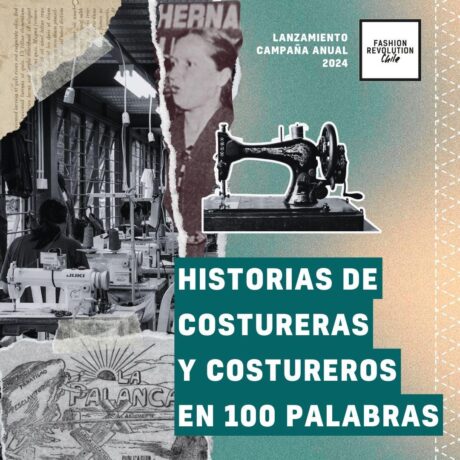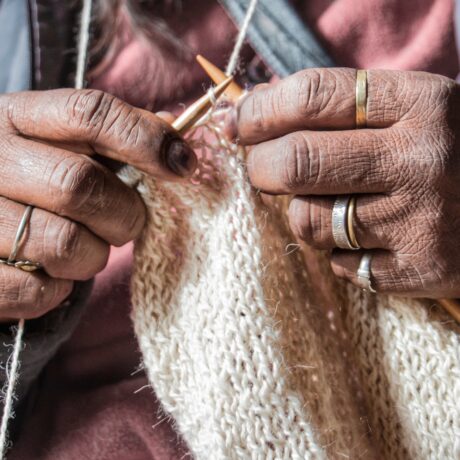Thanks Zara!
Thanks Zara. Bold title for an ethical and sustainable blog? Perhaps a little, I know, but this “thanks” to Zara is completely justified and I believe completely deserved. Want to know why?
A few weeks ago I took up the challenge launched by Fashion Revolution and the Asociación Moda Sostenible for Fashion Revolution Day encouraging us to ask the brands ‘Who Made My Clothes?’, with the aim to make us reflect about how the clothing we wear is made and to make the brands realise that, even if their garments are produced in workshops subcontracted by other companies, they have a huge responsibility to know who made them and, above all, under what working conditions.
Okay, so for my challenge I asked the Spanish brand Zara who had made my hoodie.
The truth is that when I recorded the video I did not expect that Zara, flagship of the Inditex group, would answer. Who was I that this kind of multinational brand would pay attention to my question?
Well I was completely mistaken, because just a few days after tweeting the question to the brand, I started to get messages from Zara Care (Twitter account for Zara’s customer services) informing me of the process of my query until, on the 14th April, the brand replied to my question via Facebook. I’ve pasted the messages below.
Zara Facebook message:
Hello, the item from your video is a hooded jacket sold by Zara in 2009. This garment came from a Turkish business (Uniteks Gida Tekstil) who carried out the production in two factories: BGB Tekstil and Tekova Tekstil. Both factories are located in Izmir (western Turkey); the first has around 140 workers and the second about 100. Uniteks, just like BGB and Tekova, continue to form part of Inditex’s current supply base. Their workshops have surpassed the most recent full social audit in January 2014 and in July 2013 respectively (audits of those manufacturers that obtain high ratings are carried out every 24 months), and subsequent to these dates they have received visits from technical assistance (related to implementation of improvements) as well as regular production controls (necessary to ensure complete traceability of our products).
We hope that this information is useful to you.
So my hoodie had been made by two Turkish businesses subcontracted by a third one that Zara had originally subcontracted? “That’s a lot of contracts!” was my first thought. No wonder they took 15 days to be able to reply… Still, I suppose that, whether we like it or not, in multinational businesses it’s like this every day. In the end, big businesses also subcontract me to help them develop part of their communication strategies and Corporate Social Responsibility.
The second thing that surprised me was Zara’s ability to let me know the traceability of their garment manufacturing. I understand that it has to be like that, but that didn’t stop it being a pleasant surprise. As you can see in the messages, to find out exactly they asked me for the model of the jacket. If I’m not mistaken it was Uniteks Gida Tekstil who subcontracted both BGB Tekstil and Tekova Tekstil.
The third part that caught my attention was that six years later the three companies are still working for the group and that they had social audits in 2013 and 2014 carried out by Zara. But, what exactly does this “social audit” mean?
According to Zara’s webpage:
The production facilities of all suppliers whithin Inditex’s supply chain are audited periodically by Inditex’s CSR teams or specialist external auditors in order to assess their level of compliance with the Code of Conduct for Manufacturers and Suppliers. These audits have been developed in accordance with Inditex’s Tested to Wear methodology, designed in 2007 in collaboration withIndustriALL (formerly ITGLWF), the Cambridge Centre for Business and Public Sector Ethics and Inditex. The methodology is reviewed periodically to incorporate appropriate updates and factor in the experience gained. The last review took place in 2013.
Once a supplier has signed Inditex’s Minimum Requirements, its facilities and any other factories and workshops it works with undergo an initial CSR audit.
These audits consist of facility inspection, documentary due diligence (management systems, payrolls, work hour ledgers, production records, employee documentation, permits, etc.), verification of waste management, emissions and water and energy usage, and interviews with factory managers, employees, union representatives and health and safety staff, among things.
For the duration of its business relationship with Inditex, the suppliers and their associated facilities undergo periodic audits.
I know audits can’t guarantee that the workers’ social and labour rights are respected in these subcontracted factories, given that it’s really difficult to gauge the actual reality of a company from one of these inspections (all of us have experienced one of these audits at work and surely no one – at least I haven’t ever – has actually been privately questioned by the auditor to find out exactly how the company treats them. And if it does happen, that that brave person has been able to criticise their bosses without fearing reprisal…). Still, this is the system that exists and we have to trust it. Here you can see the conditions that Inditex requires from their providers.
Not just settling for Zara’s reply, I took the opportunity to find out some more information about the businesses mentioned on the Clean Clothes Campaign (international campaign which focuses on the working conditions of garment workers), but I haven’t been able to find any reference to these three Turkish companies. If anyone from the CCC reads this and has any more info, please get in touch! I did, however, find the analysis of Zara that ‘Ropa Limpia’ (Clean Clothes in Spain) did in 2010.
Whatever the case may be, I hope that after reading my post you understand this ‘Thanks Zara’ in the title. And, as far as I know, of all the videos from the #retomodasostenible that have been recorded for Fashion Revolution Day in Spain, only this one and María Pérez-Hickman’s, who asked Esesoese, have received a response. Have a look at #retomodasostenible on facebook y #retomodasostenible on Twitter. Check #whomademyclothes to see global questions and responses.
Thanks again to Zara for paying attention to this challenge and, in this way, stepping up to Fashion Revolution Day.
From here, I encourage the brand and also the whole of the Inditex group to continue working so that all of us fashion lovers can feel proud to wear their clothing now that we’re adults and have more awareness, with the same emphasis that we used to when we were teenagers.
For my generation, Zara allowed us to be the first ‘fashion’ kids and teenagers in history; they gave us the opportunity to be fashionable at an affordable price; they made us believe that through hard work a small business could conquer the whole world. Now that we’re adults – and I think I speak for my whole generation – we would love Zara to prove that this hasn’t been achieved at the cost of other people’s health and quality of life. And if, out of ignorance, or greed or a lack of awareness, at any point in the business’ history this has been the case, I would be satisfied knowing that this is already a thing of the past and that from now onwards no one will ever see their human and workers’ rights violated so that a t-shirt might cost me a few euros less or so that the company selling it might earn a few euros more. Deal? Given Zara’s response to my question, I think it’s a deal.
Thanks in advance, Zara.
Thanks to Kezia Cochrane https://thefiveanddime.wordpress.com/ for the translation










